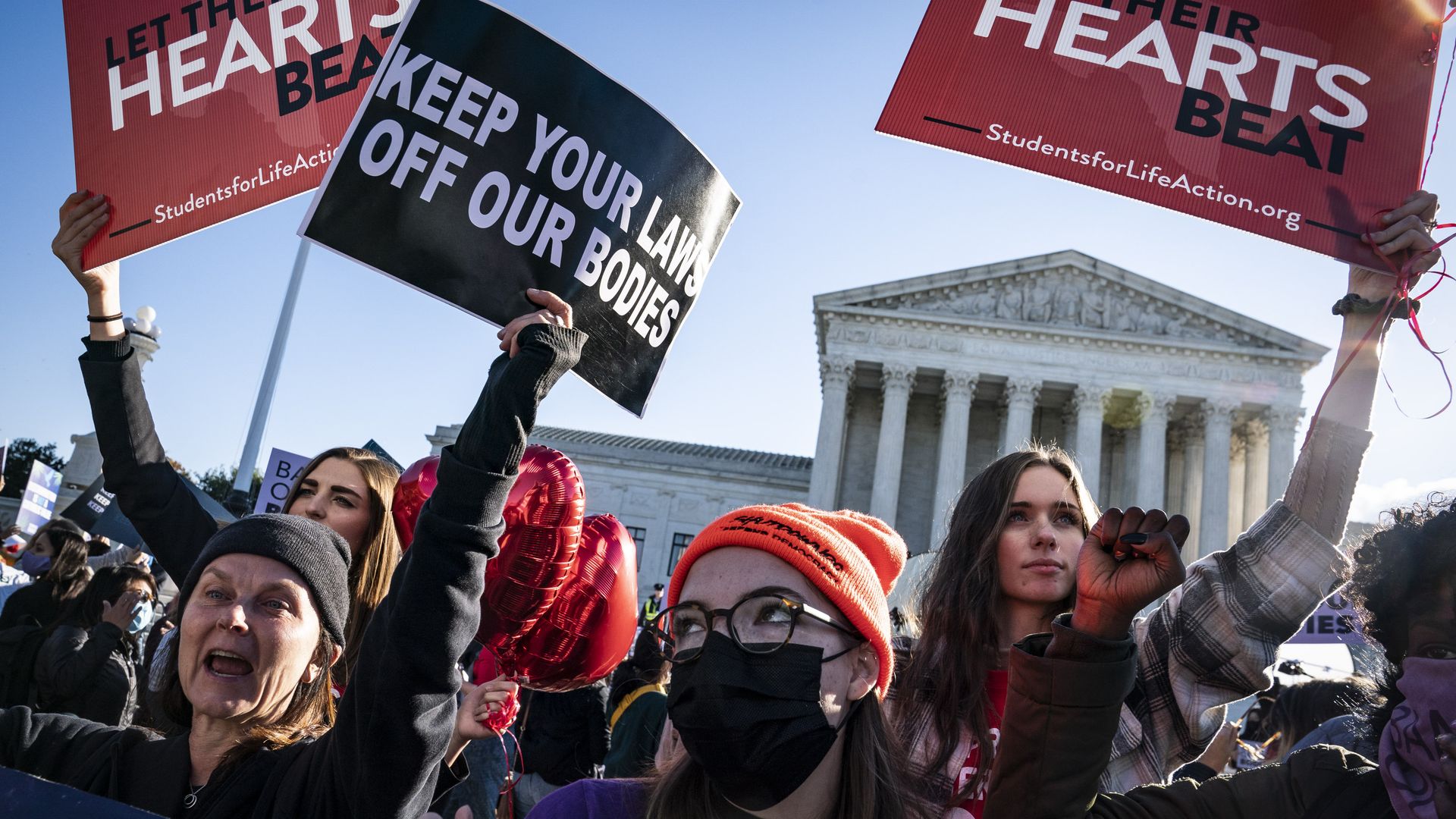The Supreme Court's abortion showdown arrives
Add Axios as your preferred source to
see more of our stories on Google.

Protesters gather at the Supreme Court during arguments about the Texas abortion law Nov. 1. Photo: Jabin Botsford/The Washington Post via Getty Images
The Supreme Court will debate today whether to overturn Roe v. Wade, and neither side is trying to lower the stakes — or to make today’s case anything less than a referendum on Roe’s very survival.
The big picture: Conventional wisdom, on both the left and right, says the court is likely to chip away at abortion rights without overturning its precedents outright. But neither side has spent much time trying to help the justices thread that needle.
- And it won’t be clear until today’s arguments how many justices are even interested in threading it.
Driving the news: The court is hearing arguments today in a challenge to a Mississippi law that bans abortions after the 15th week of a pregnancy. It's by far the most significant abortion case in years.
- Mississippi’s lone remaining abortion clinic says the state’s law violates the court’s key abortion precedents, Roe v. Wade and Planned Parenthood v. Casey. The state says the solution is to overturn those precedents.
- “Roe and Casey are unprincipled decisions that have damaged the democratic process, poisoned our national discourse, plagued the law—and, in doing so, harmed this Court,” Mississippi said in its brief to the court.
How it works: Roe and Casey hold that women have the right to terminate a pregnancy before the fetus is considered viable, which typically happens at about 23 weeks.
- States can regulate abortion, but not in a way that places an “undue burden” on that right.
What they’re saying: The court has said states can’t ban abortion before the point of viability. Mississippi has banned abortion before the point of viability.
- For the Supreme Court to find a way to uphold that ban, abortion-rights advocates argue, would be to eliminate the central right guaranteed in Roe.
- “There are no half-measures here,” Jackson Women’s Health, the clinic challenging the law, said in a brief.
The other side: Most abortions are performed before the 15th week, the state says in its briefs, and the Jackson clinic only performs the procedure until 16 weeks.
- “If people are still able to get 95 percent of the abortions that happen in this country at 15 weeks or before, that’s still very significant,” Drexel University law professor David Cohen told The New York Times.
- “That’s not Roe being overturned. Roe being chipped away? Yes. But Roe being overturned means that no abortions are legal in a state.”
What we’re watching: If there’s a middle path, it might be to throw out the viability standard altogether, evaluating abortion restrictions solely on the basis of whether they pose an undue burden on abortion access. Mississippi argues that because most procedures take place before 15 weeks, its law would pass that test.
- Such a ruling would allow states to enact tighter restrictions than they can today, but it would not allow them to ban all abortions, the way they could if Roe and Casey were overturned.
- “That would sort of anger everyone, maybe equally,” said Sarah Isgur, who worked at the Justice Department during the Trump administration and now co-hosts the legal podcast “Advisory Opinions.”
The intrigue: That’s the sort of ruling that might appeal to Chief Justice John Roberts, who often uses strategically narrow decisions to nudge the law to the right without causing significant disruptions to the status quo.
- But on a 6-3 court, Roberts doesn’t have as much power as he used to. The other conservatives can make a majority without him, if they feel he’s moving too tepidly.
- Roberts would most likely want to write this decision himself, to control its scope and its tone. He’ll only be able to accomplish that by writing a decision that’s conservative enough for four other justices to get behind, or by cobbling together a majority with both liberal and conservative votes. (Anything’s possible, but that’s the less likely outcome).
Between the lines: Because Mississippi's law is a relatively straightforward government regulation, it's seen as much more likely to succeed than Texas' bid to ban abortions after about six weeks through a highly unusual enforcement structure.
- The court is expected to rule soon on whether challenges to Texas' ban can proceed.
What’s next: Other states have passed their own laws banning abortion at various points between six and 20 weeks. If the court ultimately allows Mississippi’s 15-week ban to take effect, expect a flood of laws and lawsuits aiming to move that threshold earlier.
